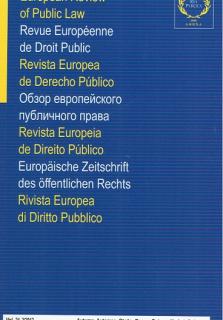
Constitutional Law / Droit constitutionnel
AUSTRIA / AUTRICHE
HARALD EBERHARD
Univ.-Prof. PD Dr. iur.,
Professor am Institut für Österreichisches und Europäisches Öffentliches Recht der Wirtschaftsuniversität Wien
Since the last contribution in this series (ERPL/REDP Vol 21 No 3 2009, 1187), the Austrian federal constitutional law has changed in several ways. First, it is interesting to report that after the first step of the constitutional reform with the amendments BGBl (Federal Law Gazette) I 2008/1 and BGBl I 2008/2, one of the main contents of the constitutional reform discussion has been implemented with the "Verwaltungsgerichtsbarkeits-Novelle 2012" (BGBl I 2012/51) introducing a first-instance administrative jurisdiction at both the Federal and the "Länder" level which can be seen as a "centennial project". This substantial reform comes into force by January 1, 2014. Second, the constitutional law has been developed by a fundamental decision of the Austrian Constitutional Court (VfGH), in which it declared for the first time, that the fundamental rights of the European Charter of Fundamental Rights can be invoked as national constitutionally guaranteed rights before the Constitutional Court. This judgment can be seen as a remarkable renunciation from its previous jurisdiction, according to which violations of European Union law could only be invoked before the Supreme Administrative Court (VwGH), and is currently providing for a vivid discussion.
Depuis notre dernière contribution dans cette série (ERPL/REDP, vol. 21 no 3, 2009, p. 1.187), le droit constitutionnel fédéral autrichien a connu plusieurs changements. Premièrement, il est intéressant de noter qu'après le premier pas accompli dans la réforme constitutionnelle avec les amendements BGBl (Federal Law Gazette) I 2008/1 et BGBl I 2008/2, l'un des principaux sujets de discussion de la réforme constitutionnelle a été adopté avec la "Verwaltungsgerichtsbarkeits-Novelle 2012" (BGBl I 2012/51), qui a introduit une juridiction administrative de premier ressort au niveau fédéral et à celui des Länder, ce qui peut être considéré comme un "projet centenaire". Cette réforme substantielle entrera en vigueur le 1er janvier 2014. Deuxièmement, le droit constitutionnel a été complété par un arrêt fondamental de la Cour constitutionnelle autrichienne (VfGH) qui a déclaré pour la première fois que les droits fondamentaux de la Charte européenne des droits fondamentaux pouvaient être invoqués comme droits nationaux constitutionnellement garantis devant la Cour constitutionnelle. Cet arrêt peut être considéré comme un remarquable revirement de jurisprudence puisque, auparavant, les violations du droit de l'Union européenne ne pouvaient être invoquées que devant la Cour suprême administrative (VwGH), et il alimente actuellement un vif débat.
Seit dem letzten Beitrag in dieser Reihe (ERPL/REDP Vol 21 No 3 2009, 1187) hat sich das Bundesverfassungsrecht in mehrfacher Hinsicht gewandelt. Berichtenswert ist zum einen, dass nach einer ersten Tranche der Verfassungsrechtsreform mit den Novellen BGBl I 2008/1 und BGBl I 2008/2 einer der wesentlichsten Inhalte der Verfassungsreformdiskussion mit der Verwaltungsgerichtsbarkeits-Novelle 2012 (BGBl I 2012/51) umgesetzt wurde: das "Jahrhundertprojekt" einer Einführung einer erstinstanzlichen Verwaltungsgerichtsbarkeit auf Ebene des Bundes und der Länder. Diese grundlegende Reform tritt mit 1. Jänner 2014 in Kraft. Zum anderen wurde das Verfassungsrecht durch eine grundlegende Entscheidung des Verfassungsgerichtshofes (VfGH) weiterentwickelt, mit der er erstmals ausgesprochen hat, dass die Grundrechte der Europäischen Grundrechte-Charta wie innerstaatliche verfassungsgesetzlich gewährleistete Rechte vor dem Verfassungsgerichtshof geltend gemacht werden können. Dieses Judikat stellt eine bemerkenswerte Abkehr von der bisherigen Rechtsprechung dar, derzufolge Verletzungen des europäischen Unionsrechts ausschließlich vor dem Verwaltungsgerichtshof (VwGH) geltend gemacht werden können, und sorgt derzeit für eine lebhafte Diskussion.





















